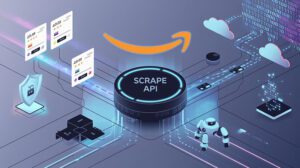With the proliferation of the internet and the growing importance of data, web scraping has become a major tool for many businesses and individuals to acquire information. However, the use of web scraping technology also raises legal and ethical issues. Laws and regulations regarding web scraping vary across different countries. Ensuring that your web scraping activities are lawful is therefore a crucial concern. This article provides a comprehensive analysis from three perspectives: domestic and international policies, real-world cases, and the compliance of specific tools.
China’s Web Scraping Legal Policies
1. Cybersecurity Law and Data Protection
China’s Cybersecurity Law, which took effect on June 1, 2017, imposes strict requirements on cybersecurity, data protection, and information security. According to this law, any organization or individual is prohibited from illegally acquiring data resources. This means that unauthorized web scraping is considered illegal.
2. Personal Information Protection Law
The Personal Information Protection Law, which came into effect on November 1, 2021, further clarifies the protection of personal information. The law stipulates that any collection or use of personal information must obtain the individual’s consent and clearly inform them of the purpose and scope of the information. When web scraping involves personal information, it must comply with this regulation, or it will face legal penalties.
3. Data Security Law
The Data Security Law, effective from September 1, 2021, aims to strengthen the standardized management of data activities. This law requires data processors to ensure data security when handling data and prohibits actions that endanger national security, public interests, or the legitimate rights of others. When web scraping involves sensitive data or large-scale data collection, special attention must be paid to compliance issues.
Web Scraping Legal Policies in Other Countries and Regions
1. General Data Protection Regulation (GDPR) in Europe
GDPR, implemented by the European Union in 2018, imposes strict requirements on data protection and privacy rights. GDPR emphasizes the right of data subjects to be informed and to give consent. Collecting personal data without consent is illegal. When using web scraping technology in Europe, it is necessary to obtain explicit user consent, or face heavy fines.
2. Computer Fraud and Abuse Act (CFAA) in the United States
CFAA, passed in 1986, aims to combat computer fraud and abuse. The law stipulates that unauthorized access to computer systems or data is illegal. When using web scraping technology in the United States, special attention must be paid to authorization issues. Any unauthorized scraping behavior may be considered illegal.
3. Regulations in Other Countries and Regions
In addition to the EU and the US, many countries and regions have similar laws and regulations. For example, Japan’s Act on the Protection of Personal Information and Australia’s Privacy Act both set clear requirements for data collection and use. When using web scraping technology in these countries and regions, local laws and regulations must also be observed.
Case Studies
Case 1: LinkedIn vs. HiQ Labs
The LinkedIn vs. HiQ Labs case is a classic in web scraping legal disputes. HiQ Labs, a data analytics company, used web scraping to collect user data from LinkedIn’s public pages to analyze and predict employee attrition risks. LinkedIn claimed that HiQ Labs’ actions violated the CFAA and took them to court. Ultimately, the court ruled that HiQ Labs’ actions did not violate the CFAA because they were accessing public data. However, the case sparked widespread discussion on the legality of web scraping.
Case 2: Facebook vs. BrandTotal
In 2020, Facebook sued BrandTotal, accusing them of using web scraping to collect Facebook user data. BrandTotal, an ad intelligence company, collected Facebook ad data through a browser extension. Facebook claimed that BrandTotal’s actions violated the platform’s terms of service and the CFAA, and demanded they cease data collection. The court ultimately supported Facebook’s claim, ruling that BrandTotal’s unauthorized actions were illegal.
Case 3: eLong vs. Fliggy
In China, eLong sued Fliggy (an online travel platform under Alibaba), accusing Fliggy of using web scraping to illegally obtain eLong’s hotel data. eLong claimed that Fliggy’s actions infringed on its trade secrets and constituted unfair competition. The court eventually ruled that Fliggy’s actions violated the Anti-Unfair Competition Law and required them to stop using web scraping to obtain eLong’s data.
How Pangolin Scrape API Complies with Web Scraping Laws
1. Transparent Terms of Use
Pangolin Scrape API is a tool specifically designed for data collection, with a development team that has established transparent and detailed terms of use. These terms clearly stipulate that users must comply with the target website’s usage policies and legal regulations. This transparency helps users understand and comply with the law, avoiding legal risks.
2. Technical Compliance
Pangolin Scrape API employs technical measures to ensure the compliance of data collection. For example, the API checks the target website’s robots.txt file and adheres to its restrictions on web scraping behavior. Additionally, the API limits the frequency and volume of data collection to avoid overloading and interfering with the target website.
3. User Authorization and Data Protection
Pangolin Scrape API emphasizes user authorization and data protection in its design. Users must explicitly state the purpose and scope of data use and obtain authorization from the relevant data subjects. This practice aligns with GDPR and other regulations concerning data collection and use, ensuring the legality of data collection.
4. Regular Audits and Updates
The Pangolin Scrape API development team regularly audits and updates the API’s terms of use and technical measures to ensure compliance with the latest legal requirements. This ongoing compliance review and improvement help users maintain compliance in an ever-changing legal environment.
Conclusion
Web scraping technology is powerful in data acquisition, but its use involves complex legal and ethical issues. In China, web scraping must comply with laws such as the Cybersecurity Law, Personal Information Protection Law, and Data Security Law. In other countries, regulations like GDPR and CFAA must be followed. Real-world cases show that unauthorized data collection often leads to legal disputes, making it crucial to ensure the legality and compliance of web scraping activities.
As a data collection tool, Pangolin Scrape API ensures the legality of its data collection process through transparent terms of use, technical compliance, user authorization and data protection, and regular audits and updates. This provides a good example for other data collection tools and users.
When using web scraping technology, users should fully understand and comply with relevant laws and regulations to ensure the legality and compliance of data collection activities, avoiding legal risks and ethical controversies.






